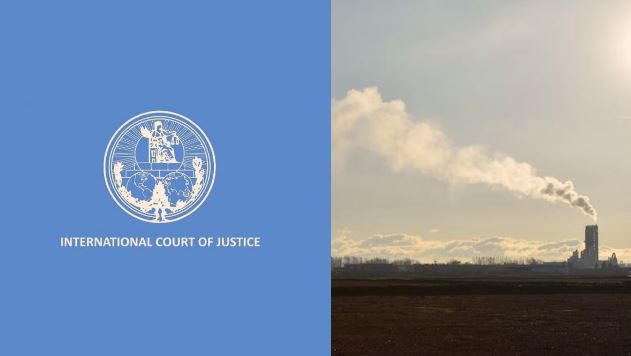In a landmark ruling that has come as a shot in the arm for the global climate movement, the International Court of Justice (ICJ) on 23 July observed that countries are legally bound to act on reducing greenhouse gas emissions and failure to do so could hold them financially liable. Although the ruling is an advisory opinion and doesn’t directly affect any nation immediately, it carries significant consequences in the global battle against climate change.
By highlighting that climate action isn’t just a policy imperative for countries but also a legally-binding duty under international law, the Hague based top UN court’s advisory opinion will hopefully come to the aid of developing nations and everyone else pushing for stronger climate action from wealthier, more industrialised countries. This was especially needed after the US has taken a U-turn in its commitment to climate action after Donald Trump’s reversal in climate policies.
Following years of advocacy from at-risk island nations concerned about the threat of rising sea levels, the UN General Assembly requested an advisory opinion from the ICJ in 2023. The ICJ was tasked with addressing two key questions: First, what responsibilities do countries have under international law to safeguard climate and environment from human-induced greenhouse gas emissions? Second, what legal repercussions do governments face when their actions, or inactions, significantly damage climate and environment?
The Pacific island nation of Vanuatu, which has a population of 3.2 lakhs, took the lead in this case, with the support from over 130 countries. It was the biggest case ever heard by the ICJ, featuring more than 150 submissions from States, international organisations, and civil society groups. Last December, over 100 States and international organisations joined in for the hearings. The court took a close look at the details of three important climate treaties — the 1994 UN Framework Convention on Climate Change (UNFCCC), the 1997 Kyoto Protocol, and the 2015 Paris Agreement — along with a few other international laws related to environment. Calling the climate crisis “an existential problem of planetary proportions that imperils all forms of life and the very health of our planet,” ICJ President Yuji Iwasawa said during the hearing that “Failure of a state to take appropriate action to protect the climate system… may constitute an internationally wrongful act.”
Climate activists and other stakeholders have hailed the advisory opinion, which received unanimous support from all 15 judges of the highest international court, viewing it as a significant milestone in global climate legislation. The court emphasised that wealthy, industrialised nations listed in Annex I of the UNFCCC must take the lead in emissions reduction and support developing countries through technology and financial assistance. Additionally, the court outlined various obligations for countries, stating that failure to meet these responsibilities could result in “an internationally wrongful act” with legal repercussions. Such consequences may include liability for full reparations to nations affected by climate-related disasters or other impacts of climate change. Furthermore, countries could be held accountable for the negligent actions of private businesses or corporations if they failed to exercise due diligence and implement sufficient regulatory or legislative measures to curb irresponsible behaviour by private entities.
The top world court’s opinion opens avenues for further legal actions, such as countries approaching the ICJ to ensure mutual accountability, as well as domestic legal challenges and instruments like investment agreements. Additionally, activists may feel empowered to initiate lawsuits against their own nations for not adhering to the ruling, which spans over 130 pages.
The timing of the ruling couldn’t have been more appropriate as people all over the world see for themselves the devastating impact that climate change has wrought upon their lives. Rising sea levels, unbearable heatwaves, floods, cyclones and other extreme events have become all too common, upending lives and destroying livelihoods. In the decade up to 2023, sea levels rose by a global average of around 4.3 cm. The world has also warmed 1.3 degrees Celsius since pre-Industrial era, primarily due to the burning of fossil fuels.
The ICJ ruling shows hope for a future in which governments can no longer ignore their legal obligations as it reinforces a fundamental principle of climate justice: Those who contributed the least to this crisis are entitled to protection, reparations, and a sustainable future. However, the most crucial aspect still remains — What authority does the ICJ have to enforce legalities on sovereign nations that refuse to comply or participate. Until & unless the rules apply to everyone, no one will be willing to take the greener route.






































